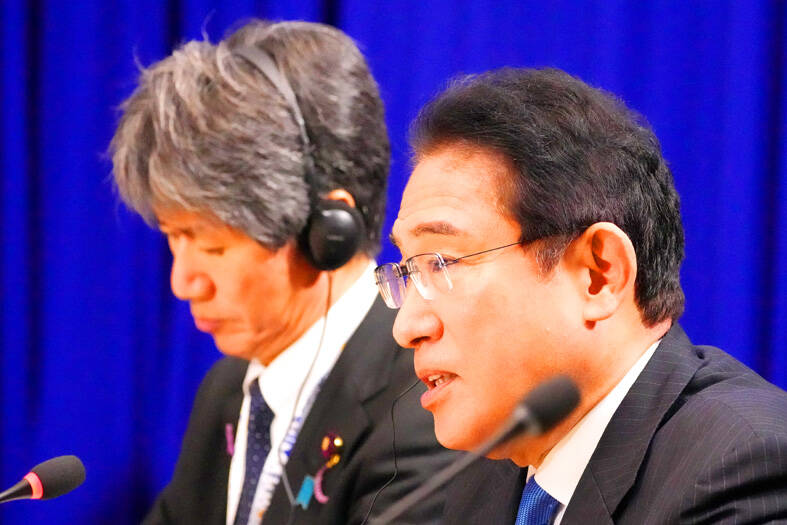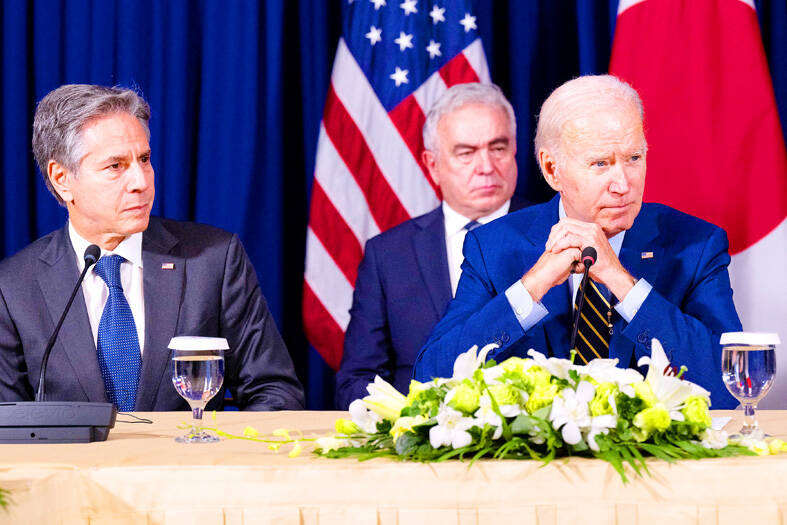Japanese Prime Minister Fumio Kishida yesterday told Asian leaders that ensuring peace and stability in the Taiwan Strait was important for regional security, and that China is increasingly escalating tensions in the region.
Addressing the ASEAN summit in Cambodia, Kishida voiced “serious concern” over the human rights situation of the Uighur people, the Japanese Ministry of Foreign Affairs said in a statement.
“There has been continued, increasing actions by China in the East China Sea that violate Japan’s sovereignty. China also continues to take actions that heighten regional tension in the South China Sea,” the statement quoted Kishida as saying.

Photo: AP
A day earlier, Kishida also underlined the importance of peace and stability in the Taiwan Strait at the summit, Tokyo Broadcasting System TV reported.
Kishida was concerned about China “trying to change the status quo with military force and carrying out economic threats,” it reported, adding that this was the first time the prime minister has discussed Taiwan-related issues at an ASEAN summit.
To help ASEAN member nations revive their economies after the COVID-19 pandemic, Japan promised to provide loans totaling ¥29.5 billion (US$212.5 million).

Photo: AFP
The loans were announced in part due to Beijing’s growing economic clout among ASEAN member countries, the report said.
Kishida hopes to invest in high-quality infrastructure in these countries to extend Japan’s influence and win support in the event of a conflict breaking out across the Taiwan Strait, the report said.
Yesterday, Kishida, US President Joe Biden and South Korean President Yoon Suk-yeol vowed a unified, coordinated response to North Korea’s threatening nuclear and ballistic missile programs, with Biden declaring that their three-way partnership is “even more important than it’s ever been” as the North is stepping up its provocations.
The three leaders met separately before sitting down together on the sidelines of the summit in Cambodia.
The meeting was heavily focused on North Korean leader Kim Jong-un’s recent escalations, although Biden said that they would also discuss strengthening supply chains and preserving peace across the Taiwan Strait, while building on the countries’ support for Ukraine in the face of Russian aggression.
Biden had also planned to seek input from Kishida and Yoon on managing China’s assertive posture in the Pacific region.
“We face real challenges, but our countries are more aligned than ever, more prepared to take on those challenges than ever,” Biden said. “So I look forward to deepening the bonds of cooperation between our three countries.”
Yoon and Kishida discussed the ongoing displays of aggression by North Korea, which has fired dozens of missiles in the past few weeks.
The launches include an intercontinental ballistic missile 10 days ago that triggered evacuation alerts in northern Japan, and the allies have warned of a looming risk that the isolated country might conduct its seventh nuclear test in the coming weeks.

‘TAIWAN-FRIENDLY’: The last time the Web site fact sheet removed the lines on the US not supporting Taiwanese independence was during the Biden administration in 2022 The US Department of State has removed a statement on its Web site that it does not support Taiwanese independence, among changes that the Taiwanese government praised yesterday as supporting Taiwan. The Taiwan-US relations fact sheet, produced by the department’s Bureau of East Asian and Pacific Affairs, previously stated that the US opposes “any unilateral changes to the status quo from either side; we do not support Taiwan independence; and we expect cross-strait differences to be resolved by peaceful means.” In the updated version published on Thursday, the line stating that the US does not support Taiwanese independence had been removed. The updated

‘CORRECT IDENTIFICATION’: Beginning in May, Taiwanese married to Japanese can register their home country as Taiwan in their spouse’s family record, ‘Nikkei Asia’ said The government yesterday thanked Japan for revising rules that would allow Taiwanese nationals married to Japanese citizens to list their home country as “Taiwan” in the official family record database. At present, Taiwanese have to select “China.” Minister of Foreign Affairs Lin Chia-lung (林佳龍) said the new rule, set to be implemented in May, would now “correctly” identify Taiwanese in Japan and help protect their rights, the Ministry of Foreign Affairs said in a statement. The statement was released after Nikkei Asia reported the new policy earlier yesterday. The name and nationality of a non-Japanese person marrying a Japanese national is added to the

AT RISK: The council reiterated that people should seriously consider the necessity of visiting China, after Beijing passed 22 guidelines to punish ‘die-hard’ separatists The Mainland Affairs Council (MAC) has since Jan. 1 last year received 65 petitions regarding Taiwanese who were interrogated or detained in China, MAC Minister Chiu Chui-cheng (邱垂正) said yesterday. Fifty-two either went missing or had their personal freedoms restricted, with some put in criminal detention, while 13 were interrogated and temporarily detained, he said in a radio interview. On June 21 last year, China announced 22 guidelines to punish “die-hard Taiwanese independence separatists,” allowing Chinese courts to try people in absentia. The guidelines are uncivilized and inhumane, allowing Beijing to seize assets and issue the death penalty, with no regard for potential

‘UNITED FRONT’ FRONTS: Barring contact with Huaqiao and Jinan universities is needed to stop China targeting Taiwanese students, the education minister said Taiwan has blacklisted two Chinese universities from conducting academic exchange programs in the nation after reports that the institutes are arms of Beijing’s United Front Work Department, Minister of Education Cheng Ying-yao (鄭英耀) said in an exclusive interview with the Chinese-language Liberty Times (the Taipei Times’ sister paper) published yesterday. China’s Huaqiao University in Xiamen and Quanzhou, as well as Jinan University in Guangzhou, which have 600 and 1,500 Taiwanese on their rolls respectively, are under direct control of the Chinese government’s political warfare branch, Cheng said, citing reports by national security officials. A comprehensive ban on Taiwanese institutions collaborating or